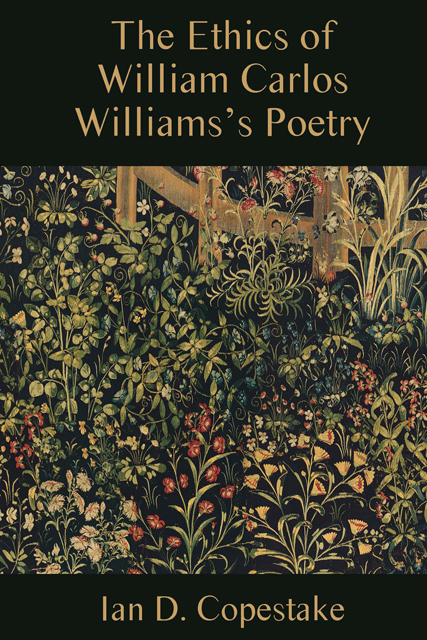Book contents
- Frontmatter
- Contents
- Acknowledgments
- List of Abbreviations
- Introduction
- 1 The Basis of Williams’s Faith in Art
- 2 Williams among the Pre-Raphaelites
- 3 A Pragmatic Approach: Williams and Emerson
- 4 Making a Start Out of Particulars: Paterson’s “Redeeming Language”
- 5 The Struggle to Believe: Williams’s Poetry of Service, Work, and Self
- Conclusion: Williams’s “Lifetime of Careful Listening”
- Bibliography
- Index
- Miscellaneous Endmatter
4 - Making a Start Out of Particulars: Paterson’s “Redeeming Language”
Published online by Cambridge University Press: 16 February 2023
- Frontmatter
- Contents
- Acknowledgments
- List of Abbreviations
- Introduction
- 1 The Basis of Williams’s Faith in Art
- 2 Williams among the Pre-Raphaelites
- 3 A Pragmatic Approach: Williams and Emerson
- 4 Making a Start Out of Particulars: Paterson’s “Redeeming Language”
- 5 The Struggle to Believe: Williams’s Poetry of Service, Work, and Self
- Conclusion: Williams’s “Lifetime of Careful Listening”
- Bibliography
- Index
- Miscellaneous Endmatter
Summary
PAUL MARIANI STATES IN HIS ESSAY “Paterson 5: The Whore/Virgin and the Wounded One Horned Beast,” that in the last completed book of Paterson,
Williams was out to de-mythologize, secularize, and return to their earth-bound origins much that had been taken over by organized religion. In this he was the true son of his Unitarian father, though one could also read that gesture of returning to the thing itself as a profound mark of respect for the holiness of the world, for a kind of incarnational poetics.
The emphasis Mariani places on Williams’s intent to “de-mythologize, secularize” is useful but insufficient, for it is limited here to a description of Paterson, book 5, and hence to the latter stages of Williams’s career. The observation, is vital as a description of the poet’s conception of his long poem, but it must be applied to the work from the outset of book 1. Mariani also emphasizes a specific and fascinating aspect of Williams’s work, namely his suggestion of the poet’s “respect for the holiness of the world.”
The impetus for Paterson is the desire to marry two separated elements, the secular and the holy. Holiness, a word denoting a state or quality derived from the Old English word hal, meaning “whole or healthy,” was synonymous for Williams with the word “clarity.” Before examining in detail the relevance of Williams’s use of this word to book 1 (1946) of Paterson, I want to distinguish between this term and another with a strong influence on it, namely Ezra Pound’s “precision,” which he associated with the morality of a writer’s work. The terms of Pound’s influence on Williams, the aspects of his work that most strongly appealed to Williams, such as his association of morality with “precision” and “clarity” in writing, supported the ethical framework Williams had already established for himself through his struggle with Unitarian idealism. Williams’s sense of the moral imperative of a work of art is found in his decisive movement away from the didactic tendencies perceived as inherent in a Poundian devotion to a “precise” conveyance of one’s meaning. The greater importance of formal organization over the clear assertion of meaning becomes the key to Williams’s restating of the “wholeness” and “health,” or holiness, of secular experience, and a means by which the ethical validity of art can be affirmed.
- Type
- Chapter
- Information
- The Ethics of William Carlos Williams's Poetry , pp. 92 - 119Publisher: Boydell & BrewerPrint publication year: 2010



